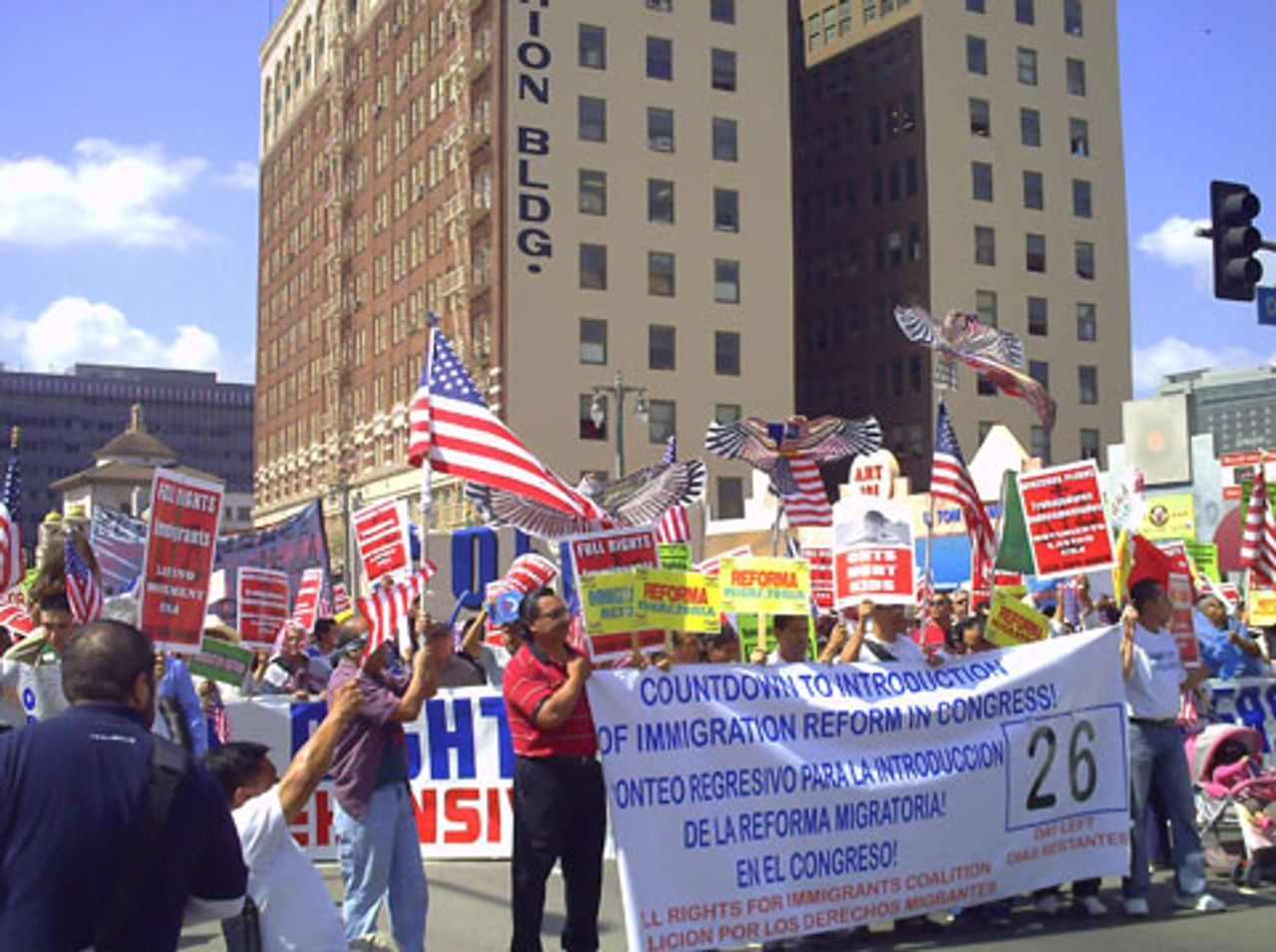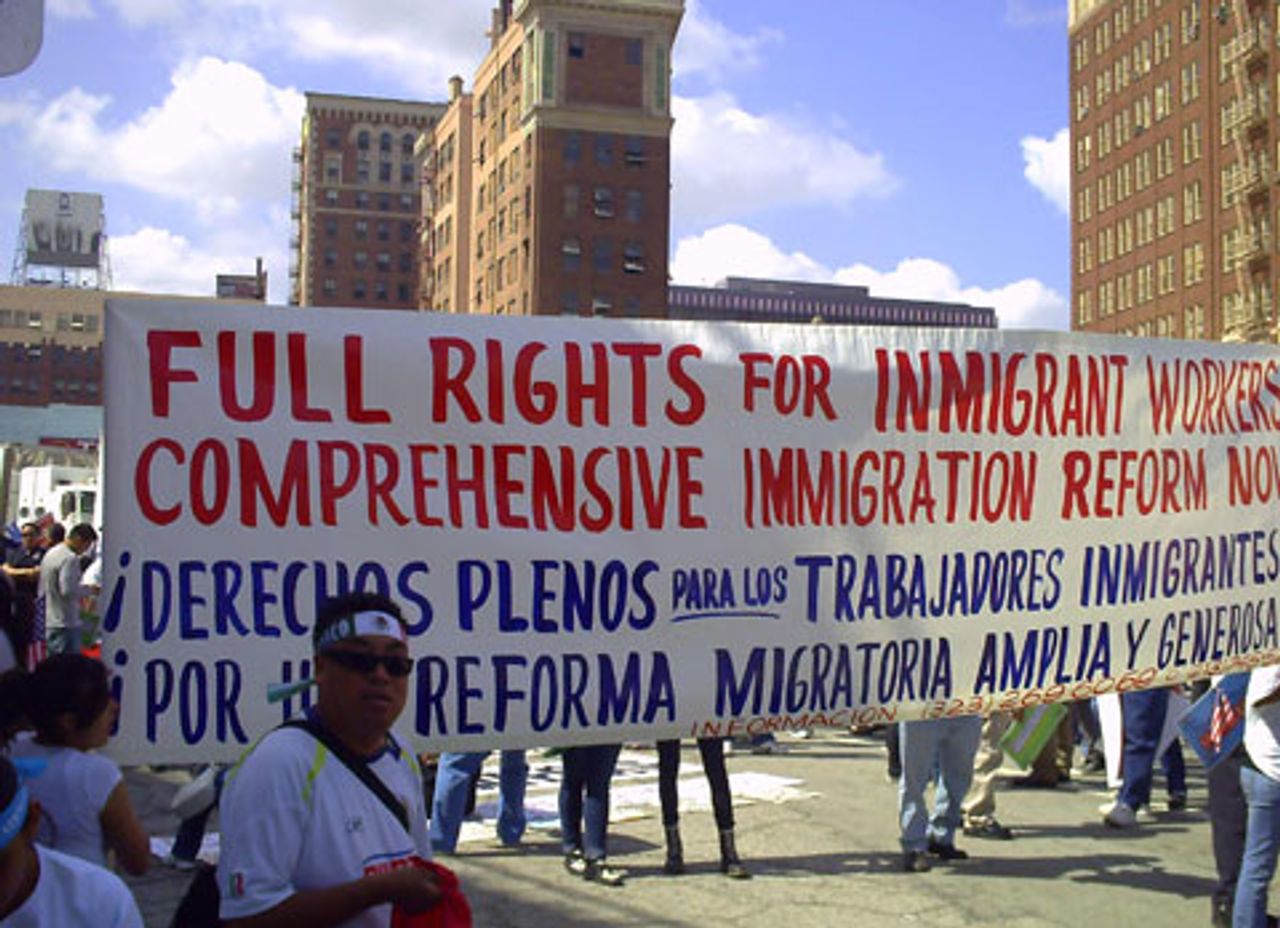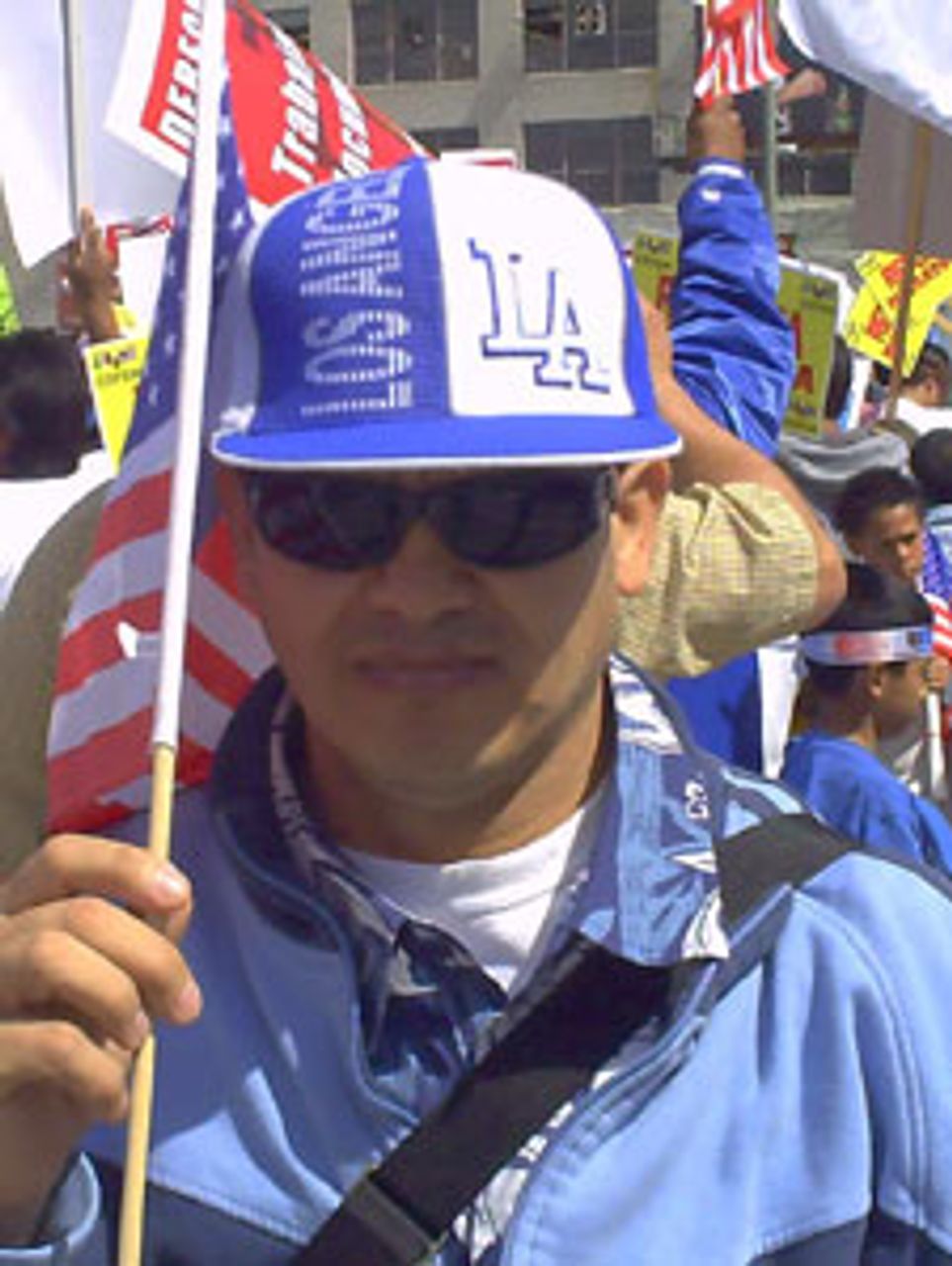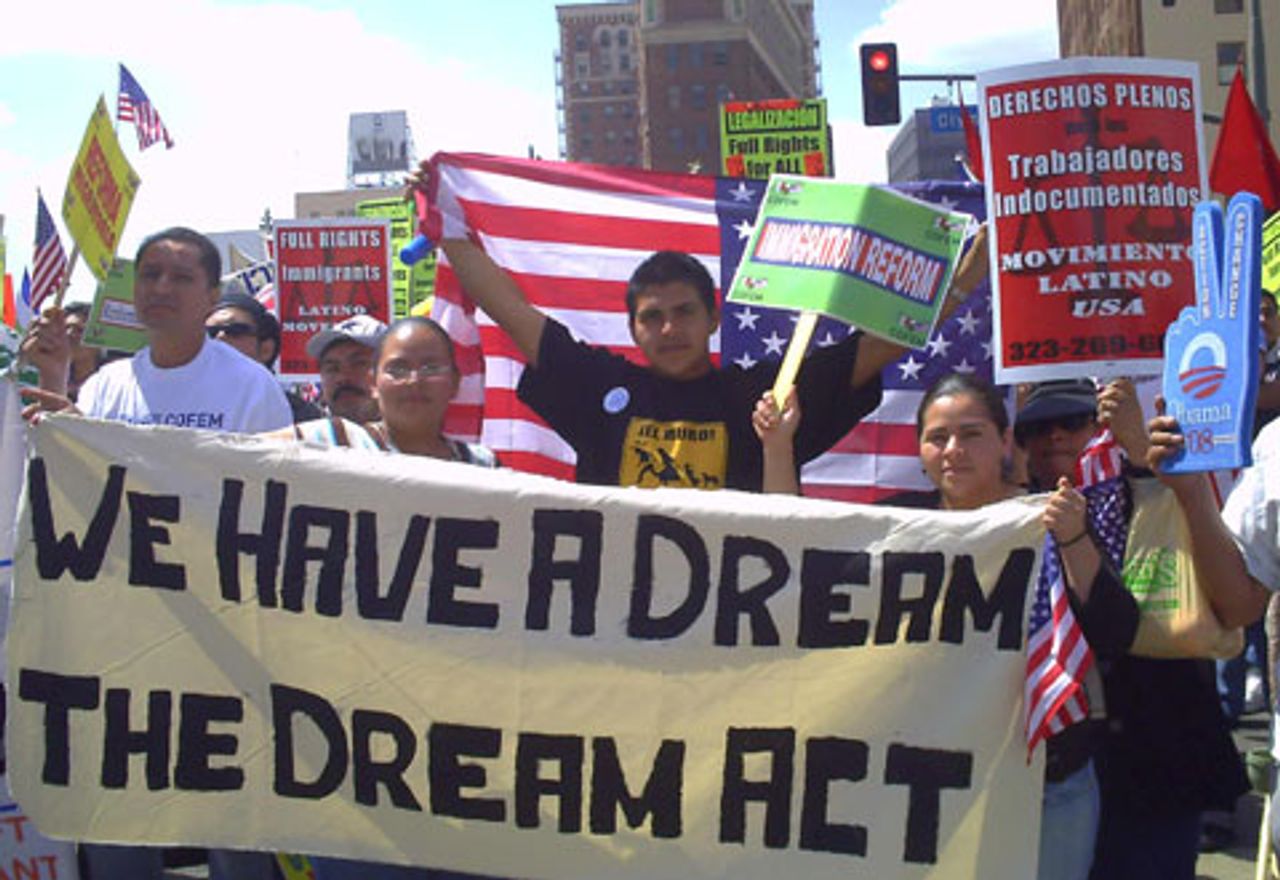 April 4 march in Los Angeles in support of immigrant rights
April 4 march in Los Angeles in support of immigrant rightsA march in support of immigrant rights was held in downtown Los Angeles on Saturday, April 4. Although the demonstration drew little attention from the corporate media, the event attracted thousands of mostly Hispanic working class people to march through the city’s Garment District and on towards its Convention Center.
The march was organized by Hermandad Mexicana Nacional, which translates to Mexican National Brotherhood. The event’s organizers were oriented towards the Democratic Party and sought to channel widespread hostility towards the persecution of undocumented immigrants and their “illegal” status into pressuring the Obama administration to support so-called immigration reform. By this is generally meant amnesty for a segment of undocumented migrants, along with the institution of some form of guest worker program so that businesses can continue to take advantage of a super-exploited labor force.
 March organized by Hermandad Mexicana Nacional last Saturday in LA
March organized by Hermandad Mexicana Nacional last Saturday in LAPresident Obama himself advocates a type of immigration “reform” that combines physical persecution of migrants—through the militarization of the border—with the further economic persecution of immigrants in the form of a delayed amnesty with heavy fines, long waits and policies that foster assimilation into English-speaking culture.
At a recent town hall meeting in Southern California, Obama laid out his proposal for immigration reform by arguing, “You’ve got to say to the undocumented workers, ‘Look, you’ve broken the law; you didn’t come here the way you were supposed to. So this is not going to be a free ride. It’s not going to be some instant amnesty. What’s going to happen is you are going to pay a significant fine. You are going to learn English.’”
In an open effort to dissuade people from speaking with representatives from the various left political organizations that came to discuss with march participants on Saturday, organizers warned those in attendance about “provocateurs” in their midst, whom they claimed were there to disrupt the event. No such provocations took place. Socialist Equality Party supporters distributed thousands of copies of articles—in both English and Spanish—on the policies of the Obama administration as well as leaflets advertising the upcoming SEP/ISSE regional conference in Los Angeles on May 10. (See “The World Economic Crisis, the Failure of Capitalism, and the Case for Socialism”)
Those interviewed by the World Socialist Web Site spoke about the conditions they face, the economic crisis and how it is affecting immigrants, life in their home countries, and the general state of political life. In an effort to defend themselves against the type of anti-immigrant attacks often encountered in the media, some also emphasized their contributions to American society.
 Danilo
DaniloDanilo is Nicaraguan and has been in the US since 1992, but has traveled back and forth several times. “I’m here to protest the injustices that they’re committing nowadays,” he said. “We know about the discrimination and racism, but it’s as much now as in years before, like in the 1950s when racism proliferated. Nowadays it is being reborn.”
Speaking about the effects of the economic crisis, both on him and his family in Nicaragua, Danilo explained, “I don’t send [home] as much [money] as I did before. Before, I had a place to live. I paid my rent. But now I can’t pay. I had to send my wife to Nicaragua with my son, who was born here, because now I can’t pay the rent here. The country’s going bankrupt. Bush has left us this legacy—destroying the economy of the US—because he fooled us with this war. He lied to us about the war, and so many millions of dollars have been spent on this war, which was a lie, a fallacy of Bush’s. So we hope that Obama brings the troops back and that all the money that was invested in the troops stays in the US.”
Fernando, a warehouse worker, has lived in the US for eight years. He came to the march with his wife and two of his children. Commenting on the situation facing immigrants in the US, he said, “It’s bad because they don’t give us our rights. They judge us for things we haven’t done, and our crime is coming to this country to work honorably. We don’t take anything from anybody, and for this they don’t want us. They don’t realize that if they stopped all the immigrants from working, the US would fall apart. They don’t see that. They take our cars. They send out raids on our workplaces. And that’s no good because we don’t steal anything from anybody.”
Regarding Obama and his campaign promises, he noted, “Well, there were a lot of promises. Like they say, the wind carries away the words. But seeing is believing. If he’s really going to carry them out, he has to be pressured (to do so). But if he doesn’t want to, well then you have the example of Arnold Schwarzenegger. He said, ‘OK, elect me a second time, and I’ll give [undocumented immigrants] driver’s licenses. When they reelected him, the month that he took office he took out the license law and he himself said, ‘If you put it before me a million times I’m going to veto it.’ We’re only like merchandise for them.”
 A section of the LA march
A section of the LA marchThe WSWS also spoke with Carlos Martínez about the exploitation faced by immigrants. “I don’t work in construction, but I’ve done it before,” he said. “The majority of the contractors don’t pay overtime and when you ask they say, ‘There’s no more (hours). Go ahead and leave. There are three other people waiting to replace you.’” He added, “The conditions are deplorable.”
On Obama’s promises, he said, “I can’t vote, but what I’ve been seeing so far is that the president is a change in this country. However, he first helps the very rich. Maybe to him that’s a good idea, but for a lot of people it’s bad that he’s helping the rich, the banks and the big companies first. They already have it all.” Carlos added, “For us, we don’t know if he’s going to help us.
“I also have American neighbors and they’re losing their houses,” he said. “They don’t have work just the same as me. They haven’t had a job for weeks, and they know what it is like to be unemployed, too.”
María Luisa is an accounting student at Glendale Community College in California, where the WSWS spoke with her at length this week. She is an undocumented student, leaving Mexico when she was 15 years old.
After several unsuccessful tries, she crossed the Mexico-California border and made it to Los Angeles, where she lives with a sister. María Luisa spoke about her life in México and the conditions immigrants face in the United States.
“I was born in Porvenir 2, in the state of Veracruz, Mexico. My family is poor by Mexican standards. My mother leases 10 hectares of land. She sells lemons from the trees that grow on the land, and she also sometimes buys pigs and chickens, butchers and sells them for a profit. She was able to send me and my brothers and sisters to school by doing that. My father is a car mechanic. He sold all his tools to pay for my passage to the United States. My parents and one of my brothers still live on that land, in primitive conditions, in a shack made of cardboard and corrugated steel.
“I made several attempts to cross the border and finally succeed on my seventh try. I was 15 at the time. Looking back on the experience, I saw it more like an adventure, and I was not concerned with the dangers of crossing the border. However, I have a friend who came across the border from Guatemala and who told me that people from Guatemala and El Salvador have a much worse time coming over. Once they cross into Mexico, they must hop on a freight train that crosses the Texas border. It is a long trip and many things can happen. Part of the area where the freight train travels is controlled by the ‘Mara Salvatrucha’ criminal gang. They are known for assaulting, robbing, even raping and killing, immigrants. When I hear those stories, I become very scared and very sad.
“Porvenir 2 is a very small town. Conditions there are the same for everyone; so many people make the trip to the United States. There is a community of people from Porvenir 2 in the neighborhood where I live. Immigrants work in the United States in part so they can send money to their parents back home. My sisters and brothers who are in the United States send whatever money they can to our parents.
“Had I stayed in Mexico, I would probably barely have finished high school. In Los Angeles, there are more opportunities; although things are not so great for immigrants either. It is hard to find a job. Immigrants are accused of taking jobs from Americans, but we take the lowest paying jobs. Some of these jobs are jobs that other people don’t want to do, like picking tomatoes. Immigrants are forced to use fake Social Security cards and persecuted. Personally, I think that immigrants make things better, not worse, for the economy. There should be an amnesty. Or, at the very least, the DREAM Act should be passed.
“I think that President Obama does not want to do anything about immigration because he feels he needs to fix the economy first. That is a mistake, because immigration reform would actually help the economy recover faster. On the other hand, if he were to make it harder for immigrants to cross the border, I think that many people in this country, many Americans, would begin to actively help people get across. People have the right to live, and to live in the country that they choose.”
